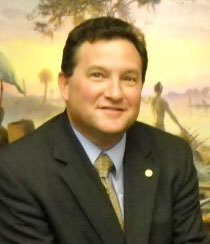State Rep. Mark Pafford (D-District 86) addressed the Royal Palm Beach Education Advisory Board last week regarding issues he expects to encounter in the upcoming legislative session, including charter schools and vouchers.
Pafford started off the Nov. 8 meeting by saying that he was relieved to no longer be bombarded with political ads when he turns on the television. “The results are in, and we can get back to work, which is a wonderful feeling,” he said.
The legislature goes into an organizational session in November, said Pafford, who last week won re-election to his third term.
“On Nov. 20, we’ll be in Tallahassee and all the chairs and ranking members will be chosen,” he said. “The caucuses will select their leaders, and then we’ll begin going into committee weeks beginning in December with one week planned, two weeks in January, three weeks in February.”
The 2013 legislative session will begin in March.
“Things will be moving pretty rapidly,” he said. “The makeup is very similar to what it was. The majority remains the majority; the minority remains the minority. The numbers are a little closer, which isn’t a bad thing, because once the numbers are closer in each chamber, there’s more discussion of the issues. If there’s too many on one side, things move quickly without talking.”
Pafford said there is a lot of interest in education, but not necessarily for the right reasons.
“I think everybody here is quite aware that there seems to be an emphasis on education in the State of Florida,” he said. “Unfortunately, it’s not always dictated by good policy-making. It’s dictated by what makes your likability ratings go up, and oddly enough, it’s education.”
Two years ago, the legislature cut $1.3 billion from public education but then last year added about $1 billion back. That’s still in the negative, but Pafford is optimistic that the legislature’s new leadership will prioritize education funding.
“I don’t think it’s going to be as top-down as it was,” he said. “I’m hoping that good ideas might flow up, which sometimes is good. It’s one thing if you’re the speaker determining and forcing it on the legislature. It’s another thing to allow committee structures to work and use the value of 119 people with various backgrounds — and some of them are actually teachers or people in education — to help craft policy. I’m certainly hoping that there is more money put into education.”
Pafford said the state’s revenue targeted for public education has declined. “That has got to change if we’re going to move up in the state rankings from the lower 40s to, let’s say, the top 20 — and that should be a goal,” he said.
Pafford noted that the last time Florida was in the top 20 for per-pupil spending was under Gov. Bob Graham.
“It has been a long time since Florida had an education structure that we can all take pride in, but if we’re going to grow the economy and grow the state, then we’ve got to have that type of education system,” he said.
Pafford also supported an increased focus on vocational education. “We’ve got to look at not only graduation rates, but what happens after high school,” he said.
The school system is still largely required to teach to the Florida Comprehensive Assessment Test (FCAT).
“You will probably see less focus, but my concern is that you will replace FCAT with something that people are happy to replace it with, but it still remains a trigger for corporate vouchers,” Pafford said. “If you change the name and it still remains a trigger, and we’re still ranking teachers and schools, and we’re still eliminating funding to schools that might need it most, then it may not be called FCAT, but it’s still a problem.”
Pafford said that he is still getting acquainted with his new district, which now covers most of the western communities and parts of suburban West Palm Beach.
“It’s great to be invited to come speak about education for no reason at all other than you guys are meeting and talking about education,” he said. “We need to have that continuous discussion, and people like me and other legislators need to understand you guys are watching and you’re paying attention.”
Education Advisory Board Chairman Lynn Balch said his biggest concern is the direction the legislature appears to be taking in pushing for more charter schools and school vouchers, as opposed to offering more support for public education.
Pafford said that in his first year as a legislator, voucher advocates asked him to support them.
“They’re very nice people, but I told them I’d love to have that conversation, but when the constitution says we need to have an adequate amount of dollars going to public education, then that means that needs to be my first priority,” he said.








